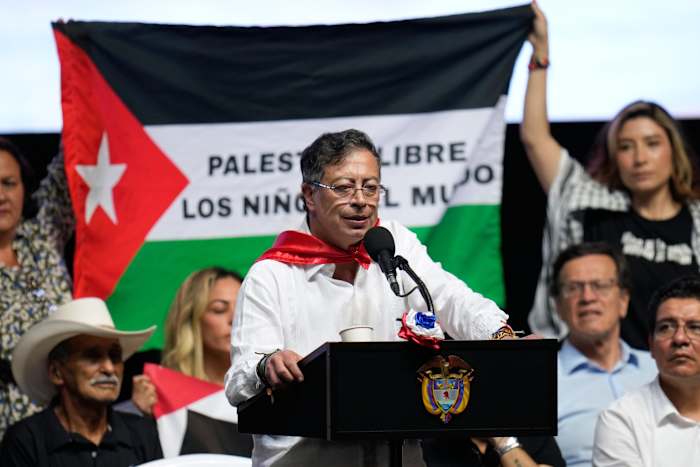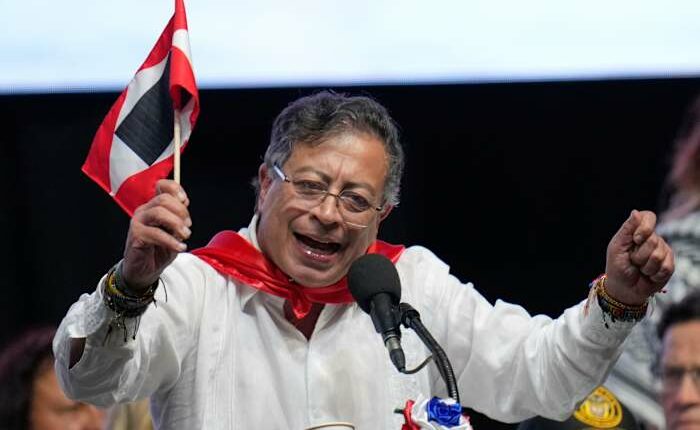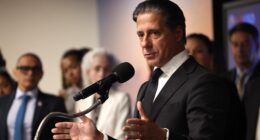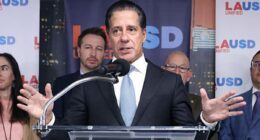Share this @internewscast.com

PALM BEACH, Fla. – In a move that heightens tensions between the U.S. and Colombia, President Donald Trump announced that the United States will significantly cut aid to Colombia, criticizing President Gustavo Petro for allegedly failing to curb drug production. Colombia has long been a steadfast ally of the U.S. in Latin America.
Trump took to social media, labeling Petro as an “illegal drug leader” who is “poorly rated and widely unpopular.” The President issued a stern warning, stating that if Petro does not shut down drug operations, the U.S. will intervene forcefully, implying it would not be a gentle approach.
Shortly after, Defense Secretary Pete Hegseth revealed that the U.S. had targeted a vessel suspected of transporting large quantities of narcotics. This action underscores the ongoing U.S. crackdown on drug trafficking in the region.
Hegseth claimed the vessel was linked to the National Liberation Army (ELN), a rebel faction involved in hostilities with Petro’s administration. Although he provided no concrete evidence, Hegseth shared a brief video showing a boat ablaze following an explosion on Friday.
In response, Petro, known for his outspoken nature on social media, dismissed Trump’s allegations and reaffirmed his commitment to combating drug trafficking in Colombia, the world’s top cocaine producer.
Petro stated, “Promoting peace in Colombia does not equate to being a drug trafficker.” He suggested Trump was misled by his advisors and emphasized his role as a staunch opponent of drug trafficking in Colombia, criticizing Trump for being “disrespectful and uninformed about Colombia.”
The Colombian Foreign Ministry described Trump’s statement as a “direct threat to national sovereignty by proposing an illegal intervention in Colombian territory.” Defense Minister Pedro Sánchez told reporters that the country “has used all its capability and also lost men and women fighting drug trafficking.”
Trump’s latest broadside against Petro raises the possibility of an expanding clash in Latin America, where the U.S. has already increased pressure on neighboring Venezuela and its leader, Nicolás Maduro.
American naval ships, fighter jets and drones are deployed in the region for what the administration has described as an “armed conflict” with drug cartels. Trump also authorized covert operations inside Venezuela.
Unlike Venezuela, Colombia is a longtime U.S. ally and the top recipient of American assistance in the region. But coca cultivation reached an all-time high last year, according to the United Nations, and there has been fresh violence in rural areas where the government spent years battling insurgents before reaching a peace deal a decade ago.
In September, the Trump administration accused Colombia of failing to cooperate in the drug war, although at the time Washington issued a waiver of sanctions that would have triggered aid cuts.
Colombia received an estimated $230 million in the U.S. budget year that ended Sept. 30, a drop from recent years that exceeded $700 million, according to U.S. figures.
Petro, Colombia’s first leftist president, has repeatedly feuded with Trump this year. Petro initially rejected U.S. military flights of deported migrants, leading Trump to threaten tariffs. The State Department said it would revoke Petro’s visa when he attended the U.N. General Assembly in New York because he told American soldiers to disobey Trump’s orders.
Petro and Trump have also been at odds over American strikes on boats in the Caribbean. On Sunday, Petro accused the U.S. government of assassination, pointing to a Sept. 16 strike that he said killed a Colombian man named Alejandro Carranza. Petro said Carranza was a fisherman with no ties to drug trafficking, and his boat was malfunctioning when it was hit.
“The United States has invaded our national territory, fired a missile to kill a humble fisherman, and destroyed his family, his children. This is Bolívar’s homeland, and they are murdering his children with bombs,” Petro wrote on social media. He said that he asked his country’s attorney general’s office to initiate legal proceedings internationally and in U.S. courts.
The White House and the Pentagon did not immediately respond to requests for comment on Petro’s accusations.
Despite Petro’s criticism, his government plans to prosecute the Colombian survivor of a more recent U.S. strike on a submersible that was allegedly carrying drugs.
Another survivor was repatriated to Ecuador, where the Ministry of the Interior said he would not face charges after prosecutors met with him and determined that he had not committed any crimes within the country’s borders.
The ELN, which Hegseth said was the target of Friday’s strike, has long denied any role in drug trafficking and offered to submit to the scrutiny of an international commission. It did not respond to Hegseth’s announcement. Colombian authorities regularly report the dismantling of cocaine laboratories and the seizure of drugs believed to belong to the guerrillas.
There have been seven U.S. strikes in the region since early September that the administration says are targeting alleged drug traffickers. At least 32 people have been killed.
Trump said Sunday that Petro had “a fresh mouth toward America.” He complained that drug smuggling continues “despite large scale payments and subsidies from the USA that are nothing more than a long term rip off of America.”
“AS OF TODAY, THESE PAYMENTS, OR ANY OTHER FORM OF PAYMENT, OR SUBSIDIES, WILL NO LONGER BE MADE TO COLOMBIA,” he added.
Elizabeth Dickinson, senior analyst for the Andes region at International Crisis Group, said “it is befuddling and profoundly unwise of the United States to alienate its strongest military partner in Latin America at a moment when tension between Washington and Venezuela are at its highest point in recent years.”
She said Washington and Bogota have long treated their relationship as foundational, but “that wisdom is being thrown out the window, with really catastrophic effects.”
Colombia lost significant U.S. funding when Trump slashed the U.S. Agency for International Development earlier this year. More cuts could affect military cooperation and undermine efforts to fight rebel groups.
“If that is cut, we will see a strategic loss of capability for the Colombian military and police at precisely the moment when they’re confronting the greatest security crisis in Colombia for over a decade,” she said.
___
Coto reported from San Juan, Puerto Rico, and Suárez from Bogotá, Colombia.
___
This story has been corrected to reflect Trump called Petro ‘an illegal drug leader,’ not ‘an illegal drug dealer.’
Copyright 2025 The Associated Press. All rights reserved. This material may not be published, broadcast, rewritten or redistributed without permission.











